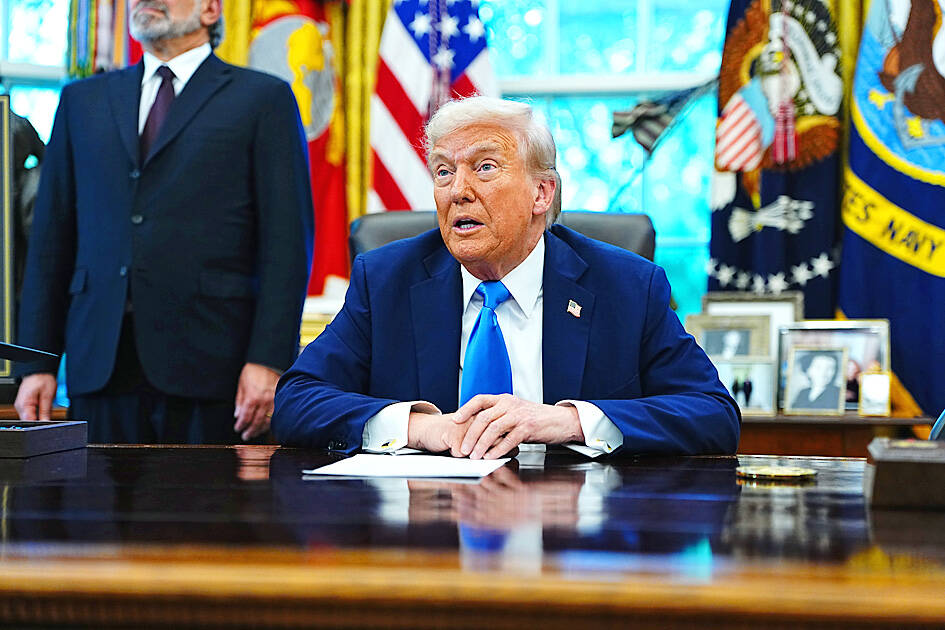US President Donald Trump on Friday hailed a call with Chinese President Xi Jinping (習近平), saying a deal to sell TikTok could be a “formality” and that he would visit China, which gave a more cautious assessment of their talks.
The leaders spoke by telephone for the second time since Trump’s return to the White House, who has tried to keep a lid on tensions, despite his once virulent criticism of China.
The US has forcefully sought to take TikTok, the social media platform hugely popular with young Americans that Trump has also used to garner support, out of Chinese hands.

Photo: EPA
Xi “approved” the deal during the phone call, Trump said, adding that, “we have to get it signed... I guess it could be a formality.”
China did not confirm any agreement.
“We’re going to have a very, very tight control,” Trump said. “There’s tremendous value with TikTok, and I’m a little prejudiced, because I frankly did so well on it.”
Xi also promised to work with the US on ending the war in Ukraine, he said.
Trump wrote on Truth Social that he and Xi “made progress on many very important issues,” including TikTok.
He also said he would meet Xi on the sidelines of an APEC summit in South Korea starting at the end of next month and that he would travel to China next year.
Xi would likewise visit the US at an unspecified time and that the two leaders would speak again by telephone, Trump said.
China offered a sterner take on the talks.
“On the TikTok issue, Xi noted that China’s position is clear: the Chinese government respects the will of enterprises and welcomes them to conduct business negotiations based on market rules, to reach solutions that balance interests and comply with Chinese laws and regulations,” a statement said. “China hopes the US side will provide an open, fair, and non-discriminatory business environment for Chinese companies investing in the United States.”
The US Congress last year passed a law to force TikTok’s parent company, ByteDance, to sell its US operations or face the app’s ban, citing national security concerns.
However, Trump on Tuesday once again put off a ban of the app.
In a statement early yesterday, ByteDance thanked Xi and Trump “for their concern about TikTok.”
“ByteDance will move forward with the relevant work in accordance with Chinese law, ensuring that TikTok US continues to serve its vast American user base,” the company said.
Asia Society Policy Institute senior vice president Wendy Cutler said that many details, including who would control the algorithm powering TikTok, were still unclear and many other irritants remained.
“Beijing is displaying a willingness to play hardball, and a need to get paid by Washington for any concessions it makes,” she said.

VAGUE: The criteria of the amnesty remain unclear, but it would cover political violence from 1999 to today, and those convicted of murder or drug trafficking would not qualify Venezuelan Acting President Delcy Rodriguez on Friday announced an amnesty bill that could lead to the release of hundreds of prisoners, including opposition leaders, journalists and human rights activists detained for political reasons. The measure had long been sought by the US-backed opposition. It is the latest concession Rodriguez has made since taking the reins of the country on Jan. 3 after the brazen seizure of then-Venezuelan president Nicolas Maduro. Rodriguez told a gathering of justices, magistrates, ministers, military brass and other government leaders that the ruling party-controlled Venezuelan National Assembly would take up the bill with urgency. Rodriguez also announced the shutdown

Civil society leaders and members of a left-wing coalition yesterday filed impeachment complaints against Philippine Vice President Sara Duterte, restarting a process sidelined by the Supreme Court last year. Both cases accuse Duterte of misusing public funds during her term as education secretary, while one revives allegations that she threatened to assassinate former ally Philippine President Ferdinand Marcos Jr. The filings come on the same day that a committee in the House of Representatives was to begin hearings into impeachment complaints against Marcos, accused of corruption tied to a spiraling scandal over bogus flood control projects. Under the constitution, an impeachment by the

Exiled Tibetans began a unique global election yesterday for a government representing a homeland many have never seen, as part of a democratic exercise voters say carries great weight. From red-robed Buddhist monks in the snowy Himalayas, to political exiles in megacities across South Asia, to refugees in Australia, Europe and North America, voting takes place in 27 countries — but not China. “Elections ... show that the struggle for Tibet’s freedom and independence continues from generation to generation,” said candidate Gyaltsen Chokye, 33, who is based in the Indian hill-town of Dharamsala, headquarters of the government-in-exile, the Central Tibetan Administration (CTA). It

China executed 11 people linked to Myanmar criminal gangs, including “key members” of telecom scam operations, state media reported yesterday, as Beijing toughens its response to the sprawling, transnational industry. Fraud compounds where scammers lure Internet users into fake romantic relationships and cryptocurrency investments have flourished across Southeast Asia, including in Myanmar. Initially largely targeting Chinese speakers, the criminal groups behind the compounds have expanded operations into multiple languages to steal from victims around the world. Those conducting the scams are sometimes willing con artists, and other times trafficked foreign nationals forced to work. In the past few years, Beijing has stepped up cooperation